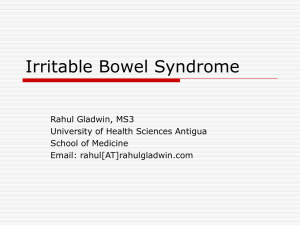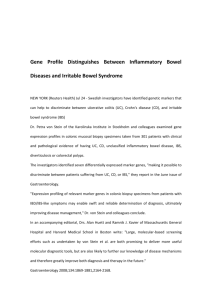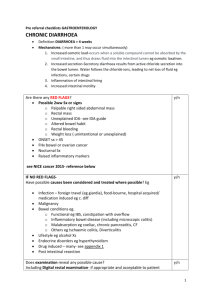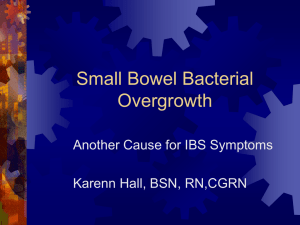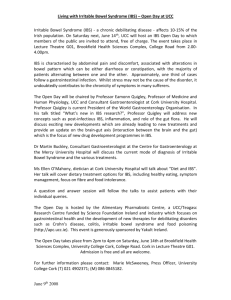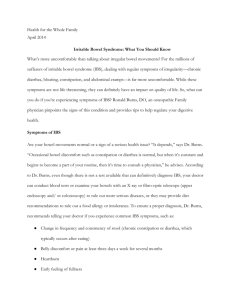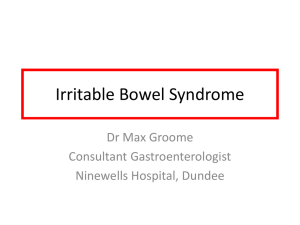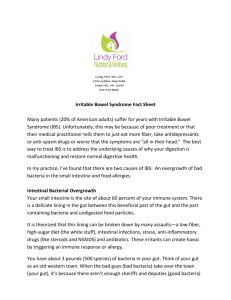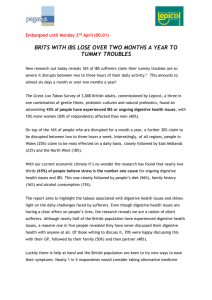Irritable Bowel Syndrome
advertisement
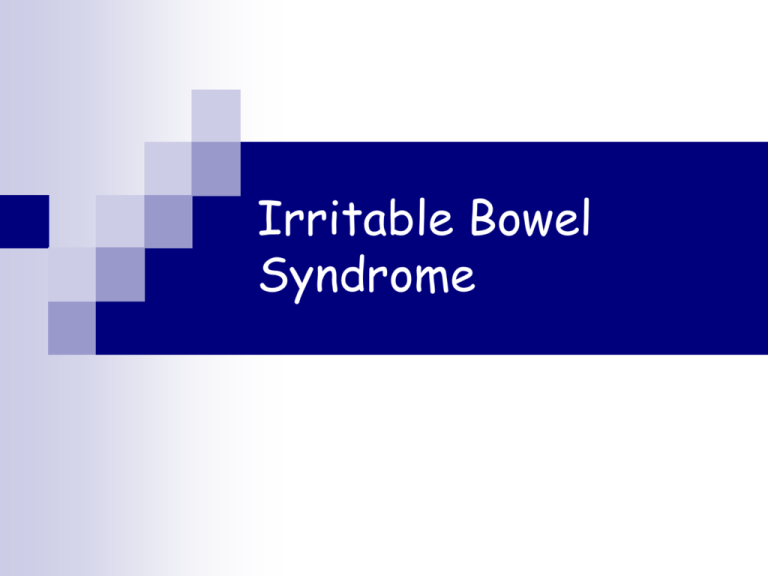
Irritable Bowel Syndrome Case A 34-year-old woman who presents to her physician with the chief complaint of a 4-month history of hard pellet-like stools and difficulty when passing stools She states that she constantly feels bloated and has taken to wearing loose-fitting clothing because she cannot tolerate anything tight around her abdomen She states that she was diagnosed with “spastic colon” in college and thinks she remembers hearing the physician talking about IBS as a diagnosis She has been able to tolerate the minimal symptoms until about 6 months ago when she began to notice some bloating and a decrease in the number of bowel movements per week Contd. She attributes the worsening symptoms to increased stress at work and her recent enrollment in an evening MBA program. Prior to 6 months ago, she states that she averaged about five stools a week. She estimates that she has had one or two bowel movements a week for the past month. She complains of straining to pass her stools and states that she has to get up 30 minutes earlier in the morning to allow for an attempt to pass a stool. She also states that the abdominal pain is not limited to when she passes a stool. She complains of abdominal pain and bloating almost continuously throughout the day for the past 2 months, although her symptoms are somewhat alleviated by passing a “good stool Contd. She also states that the symptoms are worse when she has midterms or finals or when she needs to complete a major college writing assignment. She does not remember having any gastroenteritis symptoms in the past year, and she has never eaten yogurt. She resumed taking psyllium powder 3 months ago but could not stand the taste and wasn’t sure how much it was helping. She thought about trying FiberCon but didn’t know if it would help her symptoms since both psyllium and FiberCon are laxatives. She switched to sorbitol solution, but she says it tastes too sweet and doesn’t seem to help Assessment IBS associated with: abdominal discomfort Bloating constipation What is Irritable Bowel Syndrome(IBS)? A group of functional bowel disorders Chronic abdominal complaints without a structural or biochemical cause Constitutes a major health problem with gastrointestinal (GI) symptoms The cause of IBS is unknown. Affects up to ~20 % adults in the industrialized world The condition is more frequent in women. The direct medical costs of IBS are ~ $ US 8 billion in the US each year. Symptoms of IBS Abdominal discomfort and pain Bloating, mucous in stools, diarrhea, constipation, or alternating diarrhea and constipation Depression, anxiety or stress IBS can be subdivided into Diarrhea-predominant (IBS-D) Constipation-predominant (IBS-C) Alternating diarrhea and constipation Treatment Patient Counseling and Dietary Alterations Reassurance and careful explanation of the functional nature of the disorder how to avoid obvious food precipitants are important first steps Antispasmodics anticholinergic drugs may provide temporary relief for symptoms such as painful cramps related to intestinal spasm postprandial pain is best managed by giving antispasmodics 30 min before meals belladonna alkaloids Some physicians prefer to use synthetic anticholinergics such as dicyclomine that have less effect on mucous membrane secretions and therefore produce fewer undesirable side effects Mebeverin (colofac®) an antispasmodic with a direct action on the smooth muscle of the gastrointestinal tract 135 mg three times daily by mouth before meals 100 mg three times daily has also been used A modified-release preparation is also available, taken as 200 mg twice daily Continuing… 25 mg for those aged 3 to 4 years 50 mg for those 4 to 8 years 100 mg for those 8 to 10 years 135 to 150 mg for those over 10 years Adverse Effects and Precautions adverse effects appear rare gastrointestinal disturbances dizziness, headache, insomnia, anorexia, and decreased heart rate have been reported rash, urticaria, and angioedema CONSTIPATIONPREDOMINANT DISEASE dietary fiber may be beneficial Patients should be instructed to begin with 1 tablespoonful of fiber with 1 meal daily and gradually increase the dose to include fiber with 2 and 3 meals a day until the desired outcome is achieved For patients unable to tolerate dietary bran, bulking agents such as psyllium may be substituted Laxative use is not encouraged in these patients, and it should only be used in the smallest dose for the least amount of time in cases of severe constipation The 5-HT4 agonist tegaserod is the first therapy approved by the FDA specifically for the treatment of constipation-predominant form Serotonin is important in gut function GI disorders may be related to an imbalance of serotonin in the gut an improper reaction of the digestive system to serotonin a faulty communication network between serotonin in the gut and the brain and spinal cord. Serotonin plays a major role in modulating intestinal movement and perception of pain. Helps to soften stools by releasing water. Serotonin (5-hydroxytryptamine, 5HT) A monoamine neurotransmitter Found in cardiovascular tissue, the peripheral nervous system, blood cells, and the CNS HO 95 % resides in the GI tract Serotonergic neurons secrete 5HT The function of serotonin is exerted upon its interaction with specific receptors. 14 distinct families of 5HTreceptors; 5HT1, 5HT2, 5HT3 and …. NH2 N H 5HT3 receptors and its antagonists 5HT3 receptors A ligand-gated cation channel Present in the GI tract Control sensation, contraction of intestinal muscle Release of fluid into the intestines 5HT3 antagonists Slow intestinal transit Decrease intestinal secretions Decrease the water content of stool Diminish colonic pain 5HT4 receptors and its agonists 5HT4 receptors G-protein-coupled receptor Present in the GI tract Mediate both relaxation and contraction of circular smooth-muscle strips Induces small bowel and to a lesser extent colonic fluid secretion 5HT4 agonists Accelerate gastric emptying Accelerate small and large bowel transit Increase stool water content Tegaserod in IBS-C The first selective serotonin 5HT4 receptor partial agonist approved by FDA for the treatment of abdominal pain and constipation predominent IBS patients Brand name is ZelnormTM by Novartis Pharmceu. Corp. How does tegaserod work? The exact mechanism of tegaserod’s action is not yet understood completely. Tegaserod binds with high affinity at 5HT4 receptors. The activation of 5HT4 receptors in GI tract stimulates the peristaltic reflex and intestinal secretion As a result, contractions increase and the increased contractions speed the transit of digesting food and reverse constipation. Reduces the sensitivity of the intestinal pain-sensing nerves and reduces pain by inhibiting visceral sensitivity Tegaserod –a Promising Option Tegaserod is rapidly absorbed and metabolized. Effective in increasing the frequency of stools, relieving abdominal pain and discomfort, and decreasing the sensations of bloating Diarrhea is an occasional side effect Is approved only for women Should be prescribed under the guidance of a specialist DIARRHEA-PREDOMINANT DISEASE Avoidance of certain food products may be necessary Caffeine, alcohol, and artificial sweeteners (sorbitol, fructose, and mannitol) are known to irritate the gut and produce a laxative effect Herbal medicines or teas often contain senna, which may produce diarrhea In patients with disease persistence following dietary modification, loperamide may be used for episodic management of urgent diarrhea or in situations in which the patient wishes to avoid the possibility of an acute onset of symptoms Continuing… Loperamide decreases intestinal transit, enhances water and electrolyte absorption, and strengthens rectal sphincter tone Cholestyramine may be useful in patients with diarrhea related to idiopathic bile acid malabsorption or following cholecystectomy Diarrhea-predominant IBS caused by excessive stimulation of the 5-HT3 receptor can be relieved by the drug alosetron Alosetron in IBS-D The first drug is approved for female patients by FDA Brand name is Lotronex® by Glaxo Smith Kline A potent and selective antagonist of the 5HT3 receptors How does alosetron works? The exact mechanism how alosetron relieves the symptoms of IBS-D is unknown. Serotonin in the intestines controls how pain is felt, contraction of intestinal muscle, and release of fluid into the intestines. An excessive release of or an excessive response to serotonin causes a pain and diarrhea. By blocking 5HT3 receptors, alosetron reduced pain and motor responses. Alosetron-New Drug for IBS Alosetron is rapidly absorbed and extensively metabolized. Effective in relieving pain, normalizing bowel frequency, and reducing urgency In November 2000 it was voluntarily withdrawn from the market due to severe GI adverse effects, including 113 reported cases of serious constipation and 8 cases of possible ischemic colitis and death Because this drug was highly effective in many patients, the FDA approved restricted use of alosetron in June 2002 Alosetron is now available via an FDA-approved restricted use program It is now indicated, in lower initial doses of 1 mg daily, for women with diarrhea-predominant symptoms of greater than 6 months’ duration that are not relieved by conventional therapy Antidepressant Drugs In addition to their mood-elevating effects, antidepressent medications have several physiologic effects that may be beneficial in IBS In a 2-month study of desipramine, abdominal pain improved in 86% of patients compared to 59% given a placebo Another study of desipramine in 28 IBS patients showed improvement in stool frequency, diarrhea, pain, and depression Improvements were observed mainly in diarrheapredominant patients The beneficial effects of the tricyclic compounds in the treatment of IBS appear to be independent of their antidepression actions The therapeutic benefits for the bowel symptoms occur faster and at a lower dosage Cotinuing… paroxetine may be useful in constipation-predominant patients A small placebo-controlled study of citalopram in IBS patients reported reductions in pain Antiflatulence Therapy
